Water & Sewer Billing
Water Service
To establish an account, a residential customer must either complete the Residential Water Service Application (and submit by email) or stop by City Hall (201 South Main Street) to complete. For all commercial customers, complete a Commercial Water Service Application (and submit by email) or stop by City Hall (201 South Main Street) to complete. If you are not the property owner, you are required to pay a deposit before residential before service is established.
Email Completed Applications
- Geronki Coble (gcoble@cityofgraham.com)
- Sharon Henderson (shenderson@cityofgraham.com)
Fax
(336) 570-6703
New Connections or Taps
Customers seeking a new connection or tap should contact the City of Graham Utilities Department at (336) 570-6709 to verify the availability of the desired service and any applicable fees.
Getting Started Guide
Download these documents to help you better understand how to….
Before you can pay your water bill online you need to follow this guide to get started
Pay your water bill by phone tips
Pay your water bill
The City will accept online credit card and debit card payments through the City’s Online Bill Payment service. Additionally, customers may manage their account and update contact information. You can access Online Bill Pay by clicking here. Users will be required to create a log in account before payment may be made.
Contact Us
The City of Graham’s Customer Service staff is happy answer questions pertaining to water and sewer accounts, usage, billings and payments.
- City of Graham Customer Service (336)570.6700
For water questions related to potential leaks, meter malfunctions and pool water fills requesting adjustments please contact the following staff.
- Water Billing Supervisor, Geronki Coble (336)570.6700 ext.3110 | Email
Water Saving Tips
Convenient practices and smart advice can lead to reduced water usage. The power is in your hands – Be Water Smart!
- The average family can waste 180 gallons of water per week from household leaks. That’s equal to the amount of water needed to wash more than 300 loads of laundry.
- Running a full dishwasher can eliminate one load of dishes per week and save the average family nearly 320 gallons of water annually.
- Letting a faucet run for five minutes can waste 10 gallons of water and uses enough energy to power a 60 watt light bulb for 18hrs. Turning off the tap while brushing your teeth can save 8 gallons of water per day.
- Turning off the tap while shaving, can save 10 gallons of water per day.
- A week worth of watering the lawn for 20 minutes is equal to the amount of water an average family needs for a years worth of showers.

FAQ's
To establish an account, a customer must either call the City of Graham Water and Sewer Billing Department at (336) 570-6700 for information or complete a water service application at City Hall. Tenant and Commercial accounts are required to pay a deposit before service can be established.
Customers seeking a new connection or tap should contact the City of Graham Planning Department at (336) 570-6705 to verify the availability of the desired service and any applicable fees.
Effective May 2008, all utility customers will receive their bills on a monthly basis.
Bills are due by the 18th of the month. Accounts that are not paid by the 18th will receive a late fee equal to 2% of the outstanding balance (minimum charge: $5.00) and a delinquent notice will be issued.
After the 28th of each month, any unpaid account is subject to disconnection on the next business day for delinquent balances of more than $5.00. If the 28th falls on the weekend or holiday, disconnections will be scheduled for the next business day.
An additional nonpayment fee of $40.00 is automatically added to the account. This fee is charged when the customer’s account is scheduled for disconnection, regardless of whether or not the service is actually disconnected.
The City of Graham will accept payment in the form of cash, single-party check, credit/debit card, or money order.
Payments may be made in person at the City Hall during normal business hours, online, by phone (1-888-626-8426), by bank draft or by mail. A payment drop box is located just inside the main entrance to City Hall, 201 South Main Street. Payments placed in the drop box after 5 p.m. will be considered next-day payments.
The City will accept online credit card and debit card payments through the City’s Online Bill Payment service. Additionally, customers may manage their account and update contact information. You can access Online Bill Pay by clicking here. Users will be required to create a log in account before payment may be made.
Payments received through Online Bill Pay are credited to a customer’s account immediately just as if payment was received over the counter.
You may contact Customer Service at (336) 570-6700 or refer to the Getting Started Guide for assistance.
Yes, the City does offer bank draft for Water and Sewer accounts. A signed bank draft application and a voided check are needed to initiate bank drafts.
Many customers will see charges on their bill for solid waste collection, recycling, and stormwater.
Both Water and Sewer charges are calculated based on a customer’s metered water consumption. You can determine your consumption in gallons by subtracting the prior reading on your bill from the current reading.
All active accounts, regardless of consumption, receive a minimum charge that covers the first 1,000 gallons of consumption.
Most meters in the City are now read “off site”. “Off site” means that the meter reader is not required to physically visit the meter to take a reading; rather, the reading is gathered electronically by a handheld computer. In most cases the meter reader will simply drive down the street or a nearby street to gather the readings.
All meters that are read electronically have an Electronic Reading Transmitter (ERT). Most ERTs are positioned under the meter lid with the exception of those mounted to the top of lids to improve reception.
Damaging or disconnecting an ERT will not prevent the City from collecting a reading. If an ERT is damaged or disconnected, the customer may be responsible for the damages or assessed a tampering penalty.
Most meters throughout the City and all new meters that are installed have leak indicators on them that help determine if a leak is ongoing. However, even though meter leak indicators may be able to determine if a leak is present, they are unable to pinpoint the location of a leak. A customer should contact a licensed plumber in the event a leak is suspected.
